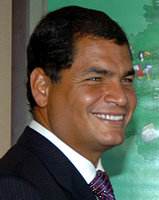Editor's note: This is the first of a two-part series examining Ecuador under President Rafael Correa. Part I examines Correa's domestic policy. Part II, appearing tomorrow, will examine his foreign policy.
Four years have passed since Ecuadorean President Rafael Correa joined his Venezuelan counterpart, Hugo Chávez, in Latin America's revolutionary fold. Correa came to office promising to usher in a new era in Ecuador and put an end to the "dark night of neoliberalism." Now, despite some notable successes, there are increasing doubts about the Correa administration's stability and longevity as well as about the legacy it will leave behind.
Public perceptions of corruption have dropped dramatically since Correa took power, and he has successfully broken the cycle of political instability that saw Ecuador inaugurate eight presidents from 1996 to 2006. Correa has successfully swept out the old political class and ushered in a host of opposition figures. Other notable gains include a remarkable "tax revolution," wherein the Correa administration has been able to boost state tax revenues by 64 percent in five years simply by improving collection rates. In addition, he has reduced Ecuador's foreign debt to one of its lowest levels on record.

